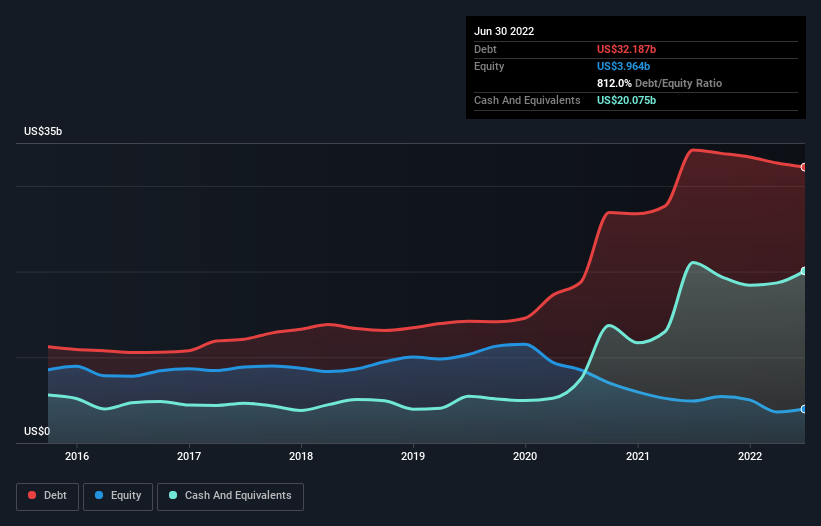Stock Analysis

Some say volatility, rather than debt, is the best way to think about risk as an investor, but Warren Buffett famously said that 'Volatility is far from synonymous with risk.' It's only natural to consider a company's balance sheet when you examine how risky it is, since debt is often involved when a business collapses. We note that United Airlines Holdings, Inc. (NASDAQ:UAL) does have debt on its balance sheet. But is this debt a concern to shareholders?
When Is Debt A Problem?
Debt assists a business until the business has trouble paying it off, either with new capital or with free cash flow. If things get really bad, the lenders can take control of the business. However, a more frequent (but still costly) occurrence is where a company must issue shares at bargain-basement prices, permanently diluting shareholders, just to shore up its balance sheet. By replacing dilution, though, debt can be an extremely good tool for businesses that need capital to invest in growth at high rates of return. The first thing to do when considering how much debt a business uses is to look at its cash and debt together.
Check out our latest analysis for United Airlines Holdings
How Much Debt Does United Airlines Holdings Carry?
You can click the graphic below for the historical numbers, but it shows that United Airlines Holdings had US$32.2b of debt in June 2022, down from US$34.2b, one year before. However, it does have US$20.1b in cash offsetting this, leading to net debt of about US$12.1b.

A Look At United Airlines Holdings' Liabilities
We can see from the most recent balance sheet that United Airlines Holdings had liabilities of US$23.4b falling due within a year, and liabilities of US$43.0b due beyond that. Offsetting these obligations, it had cash of US$20.1b as well as receivables valued at US$2.22b due within 12 months. So its liabilities outweigh the sum of its cash and (near-term) receivables by US$44.1b.
The deficiency here weighs heavily on the US$11.9b company itself, as if a child were struggling under the weight of an enormous back-pack full of books, his sports gear, and a trumpet. So we'd watch its balance sheet closely, without a doubt. At the end of the day, United Airlines Holdings would probably need a major re-capitalization if its creditors were to demand repayment. The balance sheet is clearly the area to focus on when you are analysing debt. But it is future earnings, more than anything, that will determine United Airlines Holdings's ability to maintain a healthy balance sheet going forward. So if you want to see what the professionals think, you might find this free report on analyst profit forecasts to be interesting.
In the last year United Airlines Holdings wasn't profitable at an EBIT level, but managed to grow its revenue by 144%, to US$36b. So its pretty obvious shareholders are hoping for more growth!
Caveat Emptor
Despite the top line growth, United Airlines Holdings still had an earnings before interest and tax (EBIT) loss over the last year. Indeed, it lost US$729m at the EBIT level. If you consider the significant liabilities mentioned above, we are extremely wary of this investment. That said, it is possible that the company will turn its fortunes around. Nevertheless, we would not bet on it given that it lost US$1.2b in just last twelve months, and it doesn't have much by way of liquid assets. So we think this stock is quite risky. We'd prefer to pass. There's no doubt that we learn most about debt from the balance sheet. However, not all investment risk resides within the balance sheet - far from it. For example - United Airlines Holdings has 1 warning sign we think you should be aware of.
If, after all that, you're more interested in a fast growing company with a rock-solid balance sheet, then check out our list of net cash growth stocks without delay.
Valuation is complex, but we're helping make it simple.
Find out whether United Airlines Holdings is potentially over or undervalued by checking out our comprehensive analysis, which includes fair value estimates, risks and warnings, dividends, insider transactions and financial health.
View the Free AnalysisHave feedback on this article? Concerned about the content? Get in touch with us directly. Alternatively, email editorial-team (at) simplywallst.com.
This article by Simply Wall St is general in nature. We provide commentary based on historical data and analyst forecasts only using an unbiased methodology and our articles are not intended to be financial advice. It does not constitute a recommendation to buy or sell any stock, and does not take account of your objectives, or your financial situation. We aim to bring you long-term focused analysis driven by fundamental data. Note that our analysis may not factor in the latest price-sensitive company announcements or qualitative material. Simply Wall St has no position in any stocks mentioned.
About NasdaqGS:UAL
United Airlines Holdings
Through its subsidiaries, provides air transportation services in North America, Asia, Europe, Africa, the Pacific, the Middle East, and Latin America.
Undervalued with proven track record.

